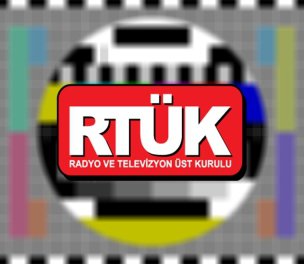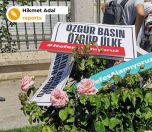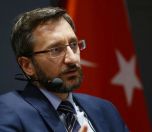Click to read the article in Turkish
Media outlets receiving funds from foreign organizations and institutions may cause national security problems for Turkey, the Radio and Television Supreme Council (RTÜK) has said.
"Unfortunately, the media is one of the most important instruments used by those who strive to design Turkey from abroad," the RTÜK said in a statement on Friday (July 23).
"Under the guise of press freedom, the codes of hostility towards Turkey are produced and negative propaganda is pumped to the public by perception operations," says the statement. "Our domestic and national media is not alone. Our country always stands with its own national media outlets."
The RTÜK statement asserts that "the dominant powers" are acting against Turkey due to its activities in the Mediterranean Sea and "regional leadership." The use of the media and the 2016 coup attempt are examples of such actions, it says.
The statement came amid a public debate on foreign-funded media outlets as both government officials and pro-opposition pundits accuse them of acting in the interest of foreign countries.
How the debate started
The debate was sparked by the recent developments in the country's refugee issue. Over the past month, hundreds of refugees from Afghanistan have been reportedly crossing into Turkey every day.
The opposition criticizes the government's silence on the new refugee wave and its agreement with the EU to keep refugees in exchange for monetary support. The main opposition Republican People's Party (CHP) leader Kemal Kılıçdaroğlu recently promised to send refugees back to their countries once he assumes power.
When some pundits on Medyascope, an online news outlet, pointed out refugee rights and criticized racist reactions to the new refugee wave, they faced a backlash on social media.
On July 21, OdaTV, a secular-nationalist-leaning news portal, published a report about funds provided to Medyascope and three other outlets by the US-based Chrest Foundation. The information OdaTV claimed to have revealed was already public on the relevant organizations' websites.
After this report and several similar reports, all media outlets funded by foreign and international organizations have become the object of anger among both government and opposition supporters on social media.
On Friday, Presidency Communications Director Fahrettin Altun hinted at new regulations to prevent "fifth column activities" by media outlets.
The financing of the independent media has been a problematic issue in Turkey as all main stream outlets are owned by business groups with close ties to the government and pro-government outlets benefit from of the public funds more than others. The government has also been criticized for using the RTÜK and the Press Advertisement Institution (BİK) to exert financial pressure on media outlets criticial of the government through monetary penalties.
CLICK - Pro-government newspapers received 78 percent of all public ad payments in 2020
CLICK - Five newspapers got 88 percent of ad penalties by Press Advertisement Institution
CLICK - Media Ownership Monitor Turkey
Developing projects and receiving funds* A project can be defined as the work to be undertaken by organizations such as associations/foundations and the institutions working in the fields of gender, children, education, violence, media, etc. The budget of this work is called "fund." * In some countries, citizens apply for "public funds" for such works, they receive their support from the state and realize their projects. In some countries, it is not possible for every organization to access "public funds." You apply for global organizations, primarily to the European Union (EU), with your projects. * If the application covering the activities, the projected outputs and expenditures is accepted, an agreement is signed. The payment is made to the bank. For Instance, if you are a foundation, you fill out the Foreign Grant Notification Form and upload it to the Foundation Information Management System https://vbys2.vgm.gov.tr/login.aspx of the General Directorate of Foundations' Foundation Services Department, together with the bank receipt of the fund. As the information regarding your project is also included in the Form, it is now known from the very first step onward why the fund is sent. * At this stage, your application is added to the list of "pending approval." If the person responsible for your foundation at the Regional Directorate of Foundations approves the fund, you start using it. You cannot withdraw the money from the bank without getting the related approval. In that case, you are being fined for this behavior. * The activities and expenditures of the project are made in line with the agreement signed with the funding institution. * Generally, annual activity and expenditure reports are prepared. * It is inspected by an internationally recognized audit company whether the expenditures are made in line with the activities and the standards indicated in the agreement. * The reports sent by the audit company are discussed and approved by the funding institution as well. * An income and expense report on all types of expenditures are submitted to the Revenue Office once a year (by March 30). * Together with the profit and loss account statement, it is also sent to the Regional Directorate of Foundations every year by June 30. * Moreover, in addition to all these procedures, the state can place associations and foundations under inspections and audits any time. European Union fundsIn addition to the Instrument for Pre-accession Assistance (IPA), which is the main financial support instrument, Turkey has been benefiting from the EU Facility for Refugees in Turkey (FRIT), the European Instrument for Democracy and Human Rights (EIDHR) and the EU's Instrument contributing to Stability and Peace (IcSP) within the frame of its financial cooperation with the EU. https://www.avrupa.info.tr/en/instrument-pre-accession-assistance-ipa-880 As Turkey is an official candidate for EU accession, the EU supports political and economic reforms in the country with financial and technical help through the IPA. These funds aim at aligning Turkish legislation and standards with the EU's, building authorities' capacity for undertaking this harmonisation, and implementing the reforms throughout the accession process. The ultimate aim of pre-accession funds is to improve the lives of individuals, by providing them with better opportunities and ensuring they enjoy standards equal to EU citizens. The EU has allocated €4,453.9 million under IPA 2014-2020 for Turkey. The priority sectors to be supported are: democracy and governance; the rule of law and fundamental rights; environment and climate action; transport; energy; competitiveness and innovation; education, employment, and social policies; agriculture and rural development; and regional and territorial cooperation. The EU has been providing funds to Turkey in the below fields. As can be seen here, the funds are principally given to non-governmental organizations: Supporting Reforms in Justice, Home Affairs and Fundamental Rights |
(HA/VK)




.jpg)




